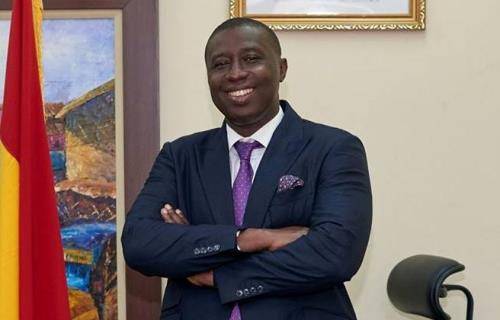A recent video that has been making rounds on social media alleges that Patrick Boamah, the Member of Parliament for Okaikwei Central, urged voters to adopt a “skirt and blouse†voting approach in the upcoming 2024 elections. The claim suggests that the MP encouraged constituents to vote for John Dramani Mahama, the flagbearer of the National Democratic Congress (NDC), for president while retaining him as an MP on the New Patriotic Party (NPP) ticket. However, this narrative has been thoroughly debunked, with evidence showing the video was doctored and the voice-over generated using artificial intelligence.
The controversy started when an X (formerly Twitter) user, khkayy27, shared the video on November 28, 2024. The post, which quickly gained traction with over 17,000 views and 20 shares, carried the caption, “So some NPP MPs are preaching skirt and blouse. I just saw this video somewhere.†The clip purportedly showed Patrick Boamah addressing constituents in New Fadama, making the alleged remarks. This stirred debate, with some users dismissing the claim as a propaganda stunt, while others demanded verification of its authenticity.
To uncover the truth, CitiVerify, a fact-checking division of Citi Newsroom, conducted an in-depth investigation into the origins and content of the video.
CitiVerify’s first step was to confirm the location and context of the video. Patrick Boamah was indeed present at the New Fadama astroturf during the time in question, as verified through his official Instagram page. He was dressed in the same green kaftan as seen in the video. However, the details in the video required closer scrutiny.
Using advanced tools such as InVID verification and Google reverse image search, CitiVerify analyzed the video for manipulation. The microphone in the clip was identified as belonging to Active TV. This led the team to Active TV’s official Facebook page, where the original video was found. The genuine footage showed Patrick Boamah discussing developmental projects in Fadama and advocating for an endowment fund to support community initiatives.
In the original video, Patrick Boamah addressed the importance of peaceful elections, speaking in the local language to encourage harmony among Christians, Muslims, and all Ghanaians. He remarked, “Elections are a time of accountability. We need peace during this election because Ghana belongs to all of us.†At no point did he mention or suggest a “skirt and blouse†voting strategy.
Further evidence emerged to refute the claims in the doctored video. Patrick Boamah himself publicly denied the allegations, reaffirming his commitment to the NPP and his support for the party’s flagbearer, Dr. Mahamudu Bawumia. “I remain loyal to the vision and leadership of our flagbearer. This is nothing but an attempt to distract and divide,†he said in a statement.
The controversy highlights the growing trend of misinformation in Ghana’s political landscape, particularly as the 2024 elections approach. Social media platforms have become fertile ground for the spread of doctored videos, AI-generated voiceovers, and fake news designed to influence public opinion. This incident serves as a reminder for citizens to critically evaluate the authenticity of information before accepting it as fact.
While the doctored video attempted to undermine Patrick Boamah’s reputation and sow discord within the NPP, it ultimately fell apart under scrutiny. The incident also raises questions about the ethical use of artificial intelligence and the need for regulatory frameworks to curb its misuse in political discourse.
As the elections draw closer, such cases of misinformation could escalate, potentially threatening Ghana’s democratic process. It is crucial for media houses, fact-checking platforms, and the general public to collaborate in identifying and combating false narratives. Fact-checking tools like CitiVerify play an essential role in debunking such claims and promoting transparency.
This episode underscores the responsibility of political actors and stakeholders to foster an environment of truth and accountability. It also highlights the importance of voter education, as informed citizens are less likely to be swayed by propaganda and falsehoods.
In conclusion, the claim that Patrick Boamah advocated “skirt and blouse†voting has been proven false. The original video, sourced from Active TV, shows the MP calling for peace and development in New Fadama, with no mention of the alleged voting strategy. As Ghana prepares for the 2024 elections, this incident serves as a cautionary tale about the dangers of misinformation and the power of fact-checking to preserve integrity in public discourse.


